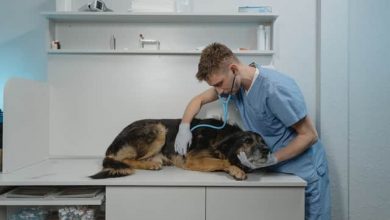Hair Loss in Dogs: Causes and Treatments for Patchy Baldness

As a dog owner, you want your furry friend to be healthy and happy. But if you’ve noticed patches of hair loss on their body, you may be concerned about their well-being. Hair loss in dogs can be caused by a number of factors, and it’s important to identify the underlying cause in order to find an effective treatment. In this article, we’ll explore the possible causes of hair loss in dogs and discuss the available treatment options.
Causes of Hair Loss in Dogs
There are many reasons why a dog may experience hair loss, including:
- Parasites: Fleas, ticks, and mites can all cause hair loss in dogs. These parasites can irritate the skin, leading to itching and scratching that can result in bald patches.
- Allergies: Dogs can develop allergies to a variety of things, including food, pollen, and dust. Allergic reactions can cause skin irritation and hair loss.
- Infections: Bacterial and fungal infections can cause hair loss in dogs. These infections can affect the hair follicles, causing hair to fall out.
- Hormonal imbalances: Hormonal imbalances, such as an underactive thyroid gland, can cause hair loss in dogs.
- Stress: Dogs can experience stress just like humans, and this stress can lead to hair loss. Common stressors for dogs include changes in routine, separation anxiety, and fear of loud noises.
See also: How much is a golden Aussie?
Treatments for Hair Loss in Dogs
The treatment for hair loss in dogs depends on the underlying cause. Some possible treatments include:
- Medications: Depending on the cause of the hair loss, your vet may prescribe medications to treat the condition. For example, if the hair loss is caused by a bacterial infection, your dog may need antibiotics.
- Allergy management: If your dog is experiencing hair loss due to allergies, your vet may recommend a special diet or allergy medication.
- Parasite control: If parasites are the cause of the hair loss, your vet may recommend a flea and tick prevention treatment.
- Hormone therapy: If the hair loss is caused by a hormonal imbalance, your vet may prescribe hormone therapy.
- Stress management: If stress is causing your dog’s hair loss, your vet may recommend ways to reduce your dog’s stress levels, such as behavior modification or medication.
Conclusion
Hair loss in dogs can be caused by a variety of factors, and it’s important to identify the underlying cause in order to find an effective treatment. If you’ve noticed patches of baldness on your dog’s body, it’s important to schedule a visit with your vet to determine the cause of the hair loss. With the right treatment, your dog can regain their full, healthy coat and live a happy, comfortable life.




